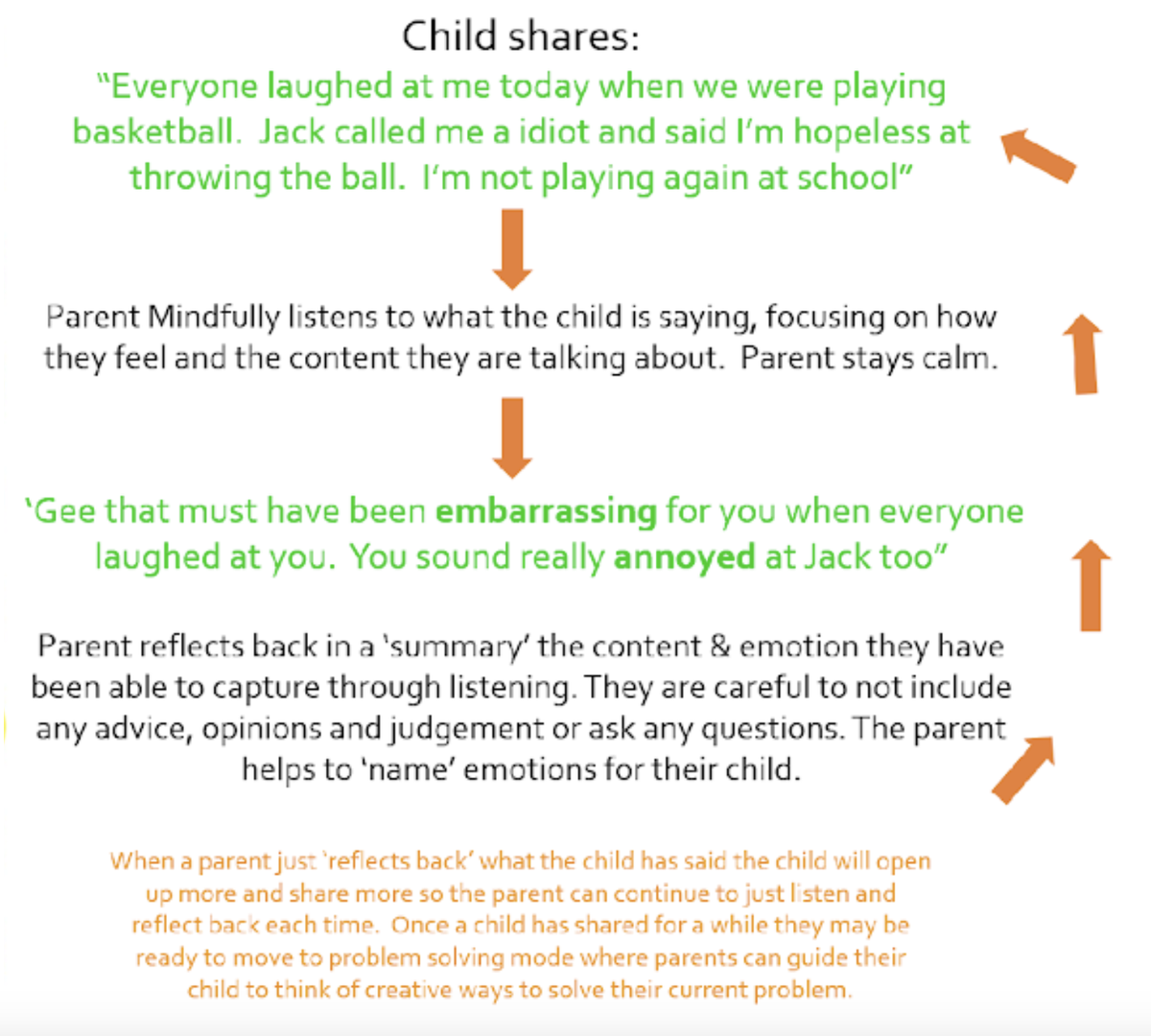Student Wellbeing

Helping children with day-to-day problems using Reflective Listening
How do we support our child effectively when they come home from school and let you know about a problem they have been having at school? It is probably one of the hardest things as a parent to not react when our child tells us they have been hurt or had a hard day. We are often quick to jump in and try to solve the problem for them, or escalate in our own emotions as we are worried about what might happen. Here are some effective ways to support our child while remaining calm.
Firstly, our children need to be heard and have their feelings heard when they have a problem. Just talking about with an adult can be soothing in itself and all the child needs. Children need at least one person in their life that truly understands how they are feeling. Giving emotional support starts with effective listening where we truly hear and understand how a situation is, how they are feeling and how it is impacting on them. Often we are quick to step in and offer solutions, ask questions or give advice but what children really need is to know that you understand how they are feeling, regardless of whether we agree with what they are saying or regardless of the situation (guidance around making good choices comes a bit later in the discussion).
Research shows that just helping children to label an emotion is enough to lessen the stress response and decrease anxiety. So how do we do reflective listening? When your child talks to you about something, truly listen to what they are saying without jumping in with advice, comments, questions, solutions and judgements that are often affected by our own emotional reactions. Keep your own perception around the issue separate and just hear what they are saying and listen out for the emotion they are expressing. Keeping your own emotions in check is so important, as this is about the child and their feelings.
Reflect back what they have said by summarising the content and the emotion e.g. ‘so you had a really tough day today and you felt really hurt by your friends.’ Children will soon let you know if this summary is in the ballpark of how they are feeling and what happened. Don’t worry about getting it all exactly right, it’s the intent that counts. Children know when parents are really listening and trying to understand their situation.
Once you reflect back on how they felt and what happened, then they will most likely share more of what they feel and what happened. This can be a real challenge for parents, as it’s so easy to fall into the trap of problem-solving for children to ease their pain, however, to ease emotional suffering children need to first express their feelings in the arms of someone who cares. Once all feelings are expressed, then it’s time to help children solve the problem (if there is something to be solved) and this can be done by encouraging them to develop effective problem-solving skills to build their resilience. It is important to remember that not all difficulties need to be ‘solved’, just supporting someone who has had a bad day by listening is often all we need to do.
When parents step in and start to ask questions and try to ‘investigate’ what is happening in their children’s lives, we can probably guarantee they will shut down and be hesitant to share. It is easy for parents to become emotional and start asking all sorts of questions in an attempt to solve or remove their children’s distress, however, their child’s distress will not be heard or comforted as the conversation quickly becomes about the parent's emotions, rather than staying focused on the child’s emotional support. Children really dislike it when parents start asking direct questions and can sense parent’s anxiety in seconds and it doesn’t take long for children to shut down and stop talking. Children won’t go to a parent who is ‘cracking it’ or ‘losing it’ when they speak to them about what is going on – they need and really like it when parents stay calm and focused on the child’s emotions.
When using the reflective listening technique, parents can see how easily their child will open up and share their feelings, share their day, share their worries, and share their friendship issues. When a parent just reflects back on what the child is saying and is not focused on their own anxieties and questions, children just keep on opening up and most importantly feel supported. As hard as it is, one of the most important skills we can learn as a parent, is to keep calm when our children are upset, and just be a comfort to them. Here is an example of Reflective Listening:
What next? Once a child has shared their feelings and what has happened and really felt heard they are able to move on by their doing something that relaxes them or using a favourite coping strategy. This will help them to relax and calm down from a tough day or experience they had. If they have a problem that actually needs to be solved, then parents can support their child in this process so it empowers the child and builds their self-efficacy. Next week I will be sharing some effective ways to help children problem-solve. In the meantime, have a go at just listening mindfully to our children, partners, and friends and see just effective it is and how it strengthens relationships.
Georgina Manning is the creator of the Peaceful Kids and Peaceful Parents programs offered here at St Mary's and facilitated our recent parent night 'Five Secrets to Building Confidence and Resilience'

